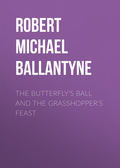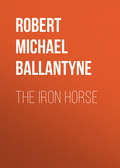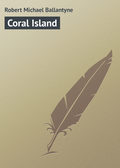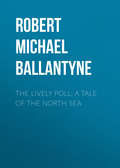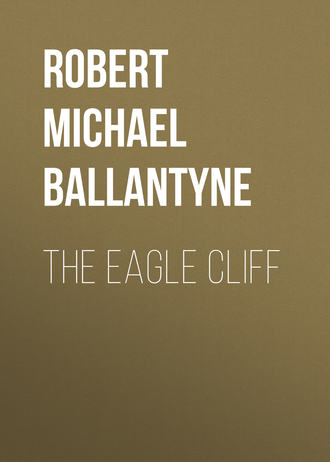
Robert Michael Ballantyne
The Eagle Cliff
Chapter Nine
A Quiet Day with a Stirring Termination
What fisher does not know the charm, the calm delight, of a quiet day by the river-side, after, it may be, months of too much contact with society? On such an occasion a congenial comrade is an advantage, but unless the comrade be congenial, one is better alone.
This may sound selfish to some ears, but is it really so? When a man has all but immolated himself for ten or eleven months, it may be, on the altar of business, art, and social duty, is a tremendous thirst for Nature and solitude altogether selfish? We think not. And evidently MacRummle thought not, as he wandered one soft, delightful morning, rod in hand, down to the river-side.
The river-side! There is something restfully suggestive in the very words. The quiet pools, the gurgling deeps, the rushing rapids, the rippling shallows, the little cascades—what ardent hopes, what wild suggestions, what grand possibilities these have for the young; what gentle excitations, what pleasant, even though sad, memories for the old!
Of course the non-fisher knows nothing of all this. His terrestrial joys are limited, poor thing! The painter, indeed, has some part in the matter—as regards his own line, so to speak—and when he goes on what is vulgarly termed his own hook. We have profound sympathy with the painter. But for the poor fellow who neither fishes nor paints, alas! To be sure he may botanise. Strange to say, we had almost forgotten that! and also geologise; but our concern at present is with fishers, or, rather, with that fishing enthusiast, MacRummle.
The sunshine of his face was second only to that of Nature. His visage beamed with satisfaction; his eyes gleamed with hope, as he sat down on the bank near to his first pool, and began to select flies.
We have probably given the impression that MacRummle was alone, but this is not strictly correct. In his own estimation he was, indeed, in absolute solitude, and, so far, his felicity was unbroken; but his steps had been dogged that morning, and the dogger was Junkie.
That eccentric youngster possessed a mind which it is not easy to analyse or describe. One strong element in it, however, was curiosity. Another was ambition. The blending of these two qualities produced wonder in Junkie—wonder that he, though as ardent a sportsman as MacRummle, should go forth frequently to fish and catch little or nothing, while the old gentleman went out and was wont to return with baskets full to overflowing. There must be a secret of some sort. He did not like to ask what that secret was, so he made up his mind to follow the old man and watch him—not of course with the slightest intention of doing anything sly or wrong, but secretly, because he was well aware that MacRummle did not like to be distracted by company—especially his company!
Following, then, at a respectful distance, and relying for success very much on the fisher’s partial blindness and deafness, Junkie went out to have a day of it. He even went so far, in the matter of forethought, as to provide himself with a massive slice of bread and cheese to sustain him while carrying on his investigations.
Before he had got far from the house, however, he encountered Donald of the ragged head, who had hung about the place in hopes of another deer-drive, and whom he styled “Tonal’,” in semi-sarcastic imitation of old Ian. Him he at once took into his confidence.
“I’ll co wuth ye,” said Donald.
“Come along, then. But mind, if you make a noise, or show yourself; if you so much as cough or sneeze, I’ll punch your head an’ tumble you into the river.”
“Fery coot,” said Donald. And upon this clear understanding they advanced.
The other members of the company at the house, meanwhile, had scattered in various directions to fish, shoot, paint or botanise, according to fancy.
We may explain here that there were several trouting streams in the vicinity of the house, besides the “river” at the head of the loch. Thus it was that MacRummle had a stream all to himself.
At first the fisher tried fly, to which he was partial, but success did not attend his efforts. The water was not in the best condition for fly, being rather swollen by recent rains. Perseverance, however, was one of MacRummle’s strong qualities. He was not to be easily beaten.
There was a certain big boulder about the size of a dog-cart near the mouth of the stream, which narrowed its bed considerably, and thus produced a formation of rock below water favourable to the shelter of fish. It also sent an oily ripple over the surface of the water, which was favourable to the operations of the fisher. The old gentleman seldom failed to raise or hook a good sea-trout there, and always made his first cast with eager expectation. But the fish were either obdurate or blind that morning. They could not or they would not see. With a slight, but by no means desponding, sigh, the old man changed his cast and tried again. He knew every stone and ledge of the pool, and cast again and again with consummate skill and unusual care. Still, without result.
“That’s odd,” he muttered, for, being naturally a sociable man, he found talking to himself an immense relief. “Try once more, just at the tail o’ yon swirl, Dick, my boy.”
His Christian name was Richard. No one would have presumed to call him Dick but himself.
No result following this appeal to the tail of the swirl, he sat down on the bank and once more changed his hook. The nature of change might have been heard by the insects among the heather close by, if they were listening, for Donald whispered to his companion,—“He’s coin’ to try pait!”
“Didn’t I bid ye hau’d your tongue?”
“Ay.”
“Do’t then.”
MacRummle dropped a worm gently into the head of the pool, and let it go with the current. Instantly the line straightened, the rod bent, the reel spun, and from the other side of the pool there leaped a lovely bar of silver, which fell back to its native element with a considerable splash.
“A two-pounder!” gasped Donald, unable to restrain his excitable spirit, as he half rose.
Junkie had him by the throat in a moment, and crammed his ragged head down among the heather.
“Tonal’!” he whispered remonstratively.
“I forgot,” whispered Donald, when the strong little hands relaxed. “I’ll not do’t again.”
“Ye better no’,” returned Junkie, with a shake of his fist that required no explanation.
By this time the fish had darted like a lightning flash twice up stream, once down, three times across, and twice into the air. At the same time the fisher had hurried up and down the bank, had tripped over two stumps and a root, had dropped his wideawake, and had very nearly gone head foremost into the pool; for his tackle was fine and his fish large. The fisher-boy gasped.
“Tonal’,” said Junkie, in very low tones, “if ye don’t behave better, I’ll send ye away.”
“It iss not easy, but I’ll try,” said he.
Donald could say no more. The best of men or boys could do no more than try. We may as well say here at once, however, that his efforts at self-control were crowned with success. He proved himself to be a great man in embryo by ruling his own spirit that day.
In a few minutes the trout was landed by means of a miniature gaff, which the fisher carried in his basket, for the purpose of securing fish that were too heavy to be pulled out by the line. It was afterwards found to be a two-and-a-half pounder, which, being an unusually good fish for that stream, was the occasion of much rejoicing on the part of the old gentleman, as he stood wiping his forehead and commenting on it.
“Capital! Not had such a fellow as that for more than a week. There’s more where that came from; but you must give the pool a rest, Dick. Try the run higher up.”
In obedience to his own orders, MacRummle went up to a part of the stream where a high cliff on one side and a steepish bank on the other caused it to flow in a deep channel, not much more than a couple of yards wide. At the head of the run was a ledge where fish were invariably captured. Towards this spot the old man hurried eagerly.
The two boys lay still in the heather, allowed him to pass, and then softly followed, bending low, and keeping as much as possible behind bushes and in hollows, until they were again close upon him. Ensconcing themselves in a convenient mass of heather, they raised their heads and saw the fisher stepping carefully from rock to rock, as he approached the run.
Rounded boulders, large or small, are never safe to walk on, even for the young and active. MacRummle found it so. His foot slipped, and he sat down, with undignified haste, in a small pool of water.
Down went the boys’ heads, that they might explode their laughter as softly as possible among the roots of the heather.
“Wass it not funny?” whispered Donald.
“I hope he’s not hurt,” replied Junkie, raising his head cautiously.
He saw that MacRummle had risen, and, with a rueful expression of face, was making insane and futile efforts to look at himself behind. A beaming smile overspread the boy’s face as he glanced at his companion, for he knew well that the old gentleman cared little or nothing for water. And this was obviously the case, for, after squeezing as much water out of his nether garments as chose to come, he proceeded to the head of the runs and resumed fishing.
“I’m beginnin’ to see through’t,” murmured Junkie, after watching for some time. “See! he has hooked another. Ye see, Tonal’, it must be lettin’ the hook drift away down under the ledges that does it. Look! He’s got ’im!”
“I’m thinking ye are right, Junkie. An’ the creat thing to know iss where the ledges lie. He keeps well back from the watter also. There maun be somethin’ in that, what-ë-ver. Ye wull be tryin’ it yoursel’ the morn, maype.”
To this Junkie vouchsafed no reply, for the fisher, having secured his fish, was proceeding further up stream. When he was sufficiently far in advance, the boys rose to their feet, and again followed him.
Thus the trio occupied themselves all the forenoon—MacRummle gradually filling his basket with fine sea-trout, Junkie storing his inquisitive mind with piscatorial knowledge and “dodges,” and Donald enjoying himself in the mere act of wallowing about in heather and sunshine.
About noon MacRummle suddenly ceased to gaze intently on the water, and placed his hand upon his waistcoat.
“Time, Dick?” he murmured, pulling out his watch. “I knew it. Commend me to nature. It’s the best time-keeper, after all—needs no regulating.”
He was wrong, as was frequently the case, but it mattered little, for there was no one to contradict him.
“Let me see,” he muttered, taking off his basket, and drawing a newspaper parcel from the pocket of his coat—in which operation he was induced by memory to make a last futile attempt to see himself behind—“what have they put up for me?”
The parcel, when opened, disclosed a tempting pile of meat sandwiches. The old gentleman spread them out on a flattish boulder, which served as an admirable table.
Having leaned his rod against a tree, he emptied the basket on a grassy spot, and arranged the silver bars in a row. Then he sat down on his basket beside the table, and gave himself up to food and contemplation.
“A goodly row,” he muttered, as well as the ham sandwich would let him. “Not a bad beginning; and such a splendid dish. There’s comfort in that, for I hate useless work of any kind. A sort of an illustration, this, of the fitness of things!”
Apparently the peculiar unfitness of simultaneous mastication and speech struck him, for he paused a few moments, then continued,—“Yes, fitness. Supplies for the table absolutely needed. Healthy exercise a consequence. Result, felicity!”
The supplies checking speech again, MacRummle looked around him, with benignant good-will to man and beast expressed on his countenance.
Craning their necks over a bank, and seeing the old gentleman thus pleasantly engaged, the two boys sank into the heather, and disappeared from view as completely as did “Clan Alpine’s warriors true,” after they had been shown to Fitz James by Roderick Dhu. Like two sparrows in a purple nest they proceeded to enjoy themselves.
“Now, Tonal’, we will grub,” said Junkie. “Why, what’s the matter with you?” he asked, on observing a sudden fall in his companion’s countenance.
“The matter?” repeated the boy. “It iss the crub that’s the matter, for I hev not a crumb with me.”
“Now, isn’t that awful?” said Junkie, with a hypocritically woeful look. “We will just have to starve. But there’s plenty of water,” he added, in a consoling tone. “Here, Tonal’, take this leather cup an’ fill it. Ye can git down to the river by the back o’ the bluff without bein’ noticed. See that ye make no noise, now. Mind what I said to ye.”
While Donald went at a slow, sad pace to fetch water, Junkie spread his handkerchief on the ground, and on this tablecloth laid out the following articles, which he took from a small bag that he had carried, slung on his shoulder,—a very large piece of loaf bread, a thick slice of cheese, two hard biscuits, an apple, a bit of liquorice, a mass of home-made toffee, inseparably attached to a dirty bit of newspaper, three peppermint lozenges, and a gully knife with a broken blade.
When Donald returned and beheld this feast, he opened his eyes wide. Then, opening his mouth, he was on the point of giving vent to a cheer, when Junkie stopped him with a glance and an ominous shake of the fist.
It is to this day an undecided question which of those feasters enjoyed himself most.
“I always bring with me more than I can eat, Tonal’, so you’re welcome to the half. ‘Fair play,’ as daddy says, although he sometimes keeps the fairest play to himself;” with which dutiful remark the urchin proceeded to divide the viands very justly.
It did not take long to consume the whole. But MacRummle was quicker even than they, possibly because he had enticing work still before him. The consequence was, that he had resumed his rod unnoticed by the boys, and in the process of his amusement, had reached that part of the bank on the top of which they lay concealed. Their devotion to lunch had prevented his approach being perceived, and the first intimation they had of his near presence was the clatter of pebbles as he made a false step, and the swish of his flies above their heads as he made a cast.
The boys gazed at each other for one moment in silence, then hastily stuffed the remnant of their feast into their pockets.
Suddenly the glengarry bonnet of Junkie leaped mysteriously off his head, and dropped on the heather behind him.
“Hanked again!” growled MacRummle from the river-bed below.
Every fisher knows the difficulty of casting a long line with a steep bank behind him. Once already the old gentleman had hanked on the bank a little lower down, but so slightly that a twitch brought the flies away. Now, however, the hank was too complicated to give way to a twitch, for the glengarry held hard on to the heather. In desperate haste, Junkie, bending low, tried to extract the hook. It need scarcely be said that a hook refuses to be extracted in haste. Before he could free it, the voice of MacRummle was heard in sighs and gasps of mild exasperation as he scrambled up the bank to disentangle his line. There was no time for consideration. Junkie dropped his cap, and, rolling behind a mass of rock, squeezed himself into a crevice which was pretty well covered with pendent bracken. Donald vanished in a somewhat similar fashion, and both, remaining perfectly still, listened with palpitating hearts to MacRummle’s approach.
“Well, well!” exclaimed the fisher in surprise; “it’s not every day I hook a fish like this. A glengarry! And Junkie’s glengarry! The small rascal! Crumbs, too! ha! that accounts for it. He must have been having his lunch here yesterday, and was so taken up with victuals that he forgot his cap when he went away. Foolish boy! It is like his carelessness; but he’s not a bad little fellow, for all that.”
He chuckled audibly at this point. Junkie did the same inaudibly as he watched his old friend carefully disengage the hook; but the expression of his face changed a little when he saw his cap consigned to the fisher’s pocket, as he turned and descended to the stream. Having given the fisher sufficient time to get away from the spot, Junkie emerged from his hiding-place.
“Tonal’,” he said, in a low voice, looking round, “ye may come oot noo, man. He’s safe away.”
The ragged head, in a broad grin, emerged from a clump of bracken.
“It wass awful amusin’, Junkie, wass it not?”
“Yes, Tonal’, it was; but it won’t be very amusin’ for me to go all the rest of the day bareheaded.”
Donald sympathised with his friend on this point, and assured him that he would have divided his cap with him, as Junkie had divided his lunch, but for the fact that he never wore a cap at all, and the ragged hair would neither divide nor come off. After this they resumed their work of dogging the fisher’s steps.
It would require a volume to relate all that was said and done on that lovely afternoon, if all were faithfully detailed; but our space and the reader’s patience render it advisable to touch only on two points of interest.
As the day advanced the heat became overpowering, and, to escape from the glare of the sun for a little, the fisher took shelter under some very tall bracken on the bank near a deep pool. In order to secure a slight feeling of pleasurable expectation while resting, he put on a bait-cast, dropped the worm into the deepest part of the pool, propped up his rod with several stones, and then lay down to watch. The turf happened to be soft and level. As a natural consequence the tired man fell sound asleep.
“What’s to be done noo, Junkie?”
“I don’t know, Tonal’.”
To make matters more exasperating, at that moment the rod began to bend and the reel to spin jerkily.
“A fush!” exclaimed Donald.
“Looks like it,” returned his friend drily.
“I better gee a yell an’ wauken him,” suggested Donald.
“Ye’d better no’,” said Junkie, shaking his fist.
“Yonder iss the end o’ yer bonnet stickin’ oot o’ his pooch, what-ë-ver,” said Donald.
“You’d better lie low an’ keep still,” said Junkie; and, without further explanation of his intentions, he went softly down the bank and crept towards the sleeper, taking advantage of every stone and root and bush as he went along. Really, for a first attempt, it was worthy of the child of a Pawnee brave.
MacRummle was a heavy sleeper, so Junkie had no difficulty in recovering his cap. Putting it on, he returned the way he had come.
“That wass cliver, man,” said the admiring Donald, when his friend rejoined him.
Junkie accepted the compliment with a dignified smile, and then sat down to wait; but it was a severe trial of patience to both of them, for the old man slept steadily on, and even snored. He seemed, in short, to have fairly gone to bed for the night.
“What say ye to bomb stanes at ’um?” suggested Donald.
“An’ kill ’im, maybe,” returned Junkie, with sarcasm in his eye.
“Heave divits at ’um, then.”
“Ay; that’s better.”
Accordingly, the two urchins tore up a mass of turf which was much too heavy to heave.
“Let’s row’d,” suggested the active-minded Donald.
As this also met the approval of Junkie, they carried the “divit,” or mass of turf, to the bank just above the sleeper, and, taking a careful aim, let it go. The bank was not regular. A lump diverted the divit from its course, and it plunged into the pool, to the obvious discomposure of the fish, which was still at intervals tugging at the line. Another divit was tried, but with similar result. A third clod went still further astray. The bombardment then became exciting, as every kind of effort does when one begins to realise the beneficial effect of practice.
“I can see how it is,” whispered Junkie, as he carefully “laid” the next gun. “If we keep more to the right, it’ll hit that lump o’ grass, glance into the hollow, and—”
He stopped abruptly, and both boys stood in crab-like attitudes of expectation, ready to fly, for the divit took the exact course thus indicated, and bounding down the bank, hit MacRummle fair on his broad back.
The guilty ones dived like rabbits into the bracken.
“Bless me!” exclaimed the old gentleman, jumping up and shaking the dry earth off. “This is most remarkable. I do believe I’ve been asleep. But why the bank should take to crumbling down upon me is more than I can understand. Hallo! A fish! You don’t deserve such luck, Dick, my boy.”
Winding in the line in a way which proved that the divit had done him no harm, he gave utterance to an exclamation of huge disgust as he drew an eel to the bank, with the line entangled hopelessly about its shiny body. This was too much for MacRummle. Unable to face the misery of disentanglement, he cut the line, despatched the eel, attached a new hook, and continued his occupation.
At the head of the pool in question the bank was so precipitous and high that the boys could see only the top of the rod swinging gracefully to and fro as the patient man pursued his sport. Suddenly the top of the rod described a wild figure in the air and disappeared. At the same moment a heavy plunge was heard.
“Hech! he’s tum’led in the pool,” gasped Donald.
They rushed to the overhanging edge of the cliff and looked down. Sure enough MacRummle was in the water. They expected to see him swim, for Junkie knew he was an expert swimmer; but the poor man was floating quietly down with the current, his head under water.
“Banged his heed, what-ë-ver!” cried Donald, jumping up and bounding down the bank to the lower and shallow end of the pool. Quick though he was, Junkie outran him; but the unfortunate MacRummle was unintentionally quicker than either, for they found him stranded when they got there.
Running into the water, they seized him by the hair and the collar of his coat, and dragged him into the shallow part easily enough, but they had not strength to haul him ashore.
“Fetch a divit, Tonal’—a big one, an’ I’ll keep up his head.”
One of the masses of recent artillery was fetched, and the fisher’s head was gently pillowed on it, so as to be well out of the water.
“There’s no cut that I can see,” said Junkie, inspecting the head critically; “he’s only stunned, I think. Noo, Tonal’, cut away to the hoose. Run as ye never ran before and tell them. I’ll stop beside him for fear his heed slips in again.”
Donald went off like a shot. Junkie went a few steps with him, intending to fetch another divit. Looking back, he saw what made him sink into the heather, and give a low whistle. Donald heard it, stopped, and also hid himself, for MacRummle was seen trying to rise. He succeeded, and staggered to dry land, when, sitting down on a stone, he felt himself all over with an anxious expression. Then he felt a lump on the back of his head, and smiled intelligently. After that he squeezed as much water out of his garments as he could, quietly took down his rod, ascertained that the fish in his basket were all right, then looked with some perplexity at the big divit lying in the shallow close to where he stood, and finally, with a highly contented expression of countenance, wended his way homeward.
The two boys gave him time to get well out of sight in advance, and then followed his example, commenting sagely as they went, on the desirability of possessing pluck in old age, and on the value of the various lessons they had learned that day.




